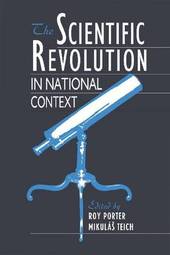
|
The Scientific Revolution in National Context
Paperback / softback
Main Details
| Title |
The Scientific Revolution in National Context
|
| Authors and Contributors |
Edited by Roy Porter
|
|
Edited by Mikulas Teich
|
| Physical Properties |
| Format:Paperback / softback | | Pages:320 | | Dimensions(mm): Height 227,Width 151 |
|
| Category/Genre | History of science |
|---|
| ISBN/Barcode |
9780521396998
|
| Classifications | Dewey:509 |
|---|
| Audience | | Professional & Vocational | | Tertiary Education (US: College) | |
|---|
| Illustrations |
Worked examples or Exercises
|
|
Publishing Details |
| Publisher |
Cambridge University Press
|
| Imprint |
Cambridge University Press
|
| Publication Date |
25 September 1992 |
| Publication Country |
United Kingdom
|
Description
The "Scientific Revolution" of the sixteenth and seventeenth centuries continues to command attention in historical debate. What was its nature? How did it develop? Controversy still rages about the extent to which it was essentially a "revolution of the mind," or how far it must also be explained by wider considerations--social, economic, political and cultural. In this volume, leading scholars of early modern science argue the importance of specifically national contexts for understanding the transformation in natural philosophy between Copernicus and Newton. Distinct political, religious, cultural and linguistic formations shaped scientific interests and concerns differently in Italy, France, Britain, the Germanies, Spain, and so on, and explain different levels of scientific intensity. Questions of institutional development, and of the transmission of scientific ideas, are also addressed. The emphasis on national determinants makes this volume an entirely original contribution to the study of the scientific revolution.
Reviews'In this successful formula the subject is essentially treated by specialists on a national basis, this volume offering France (L. W. Brockliss), the German Lands (William Clark), the Low Countries (Harold Cook), Poland (Jerzy Dobrzycki), Iberia (David Goodman), England (John Henry), Bohemia (Josef Smolka), Sweden (Sven Widmalm), Italy (Mario Biagoli), and Scotland (Paul Wood), as well as an editorial introduction.' Archives
|